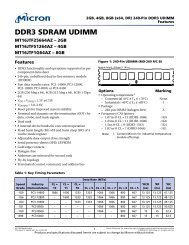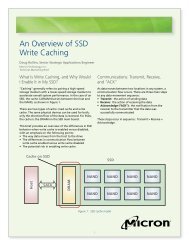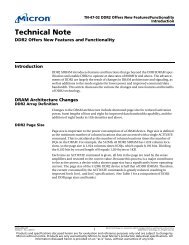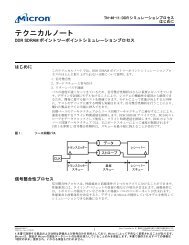Code of Business Conduct and Ethics - Micron
Code of Business Conduct and Ethics - Micron
Code of Business Conduct and Ethics - Micron
Create successful ePaper yourself
Turn your PDF publications into a flip-book with our unique Google optimized e-Paper software.
For potential conflict issues, team members are not responsible for learning about the<br />
activities <strong>of</strong> friends or the activities <strong>of</strong> family members who do not reside with that<br />
team member. Team members need only be concerned with circumstances that they<br />
actually know about.<br />
Investments<br />
Team members <strong>and</strong> their close relatives <strong>and</strong> friends need to be careful that their<br />
investments do not create conflicts <strong>of</strong> interest, impairing the team member’s ability<br />
to make objective decisions on behalf <strong>of</strong> <strong>Micron</strong>. Any “substantial interest” in a<br />
competitor, supplier or customer requires prior approval as described in the section<br />
on “Obtaining Approval When A Conflict Of Interest Is Involved.” A “substantial<br />
interest” means any economic interest that might influence or appear to influence<br />
a team member’s judgment. Publicly-traded mutual funds, index funds, <strong>and</strong> similar<br />
poolings <strong>of</strong> securities, when the individual investor has no say in which investments<br />
are included, usually do not present conflicts.<br />
Some investments are always wrong:<br />
• Never invest in a supplier if you have any involvement in the selection or assessment<br />
<strong>of</strong>, or negotiations with, the supplier, or if you supervise anyone who has such<br />
responsibility; <strong>and</strong><br />
• Never invest in a customer if you are responsible for dealings with, or are involve in<br />
negotiations with, that customer or supervise anyone with such responsibility.<br />
Usually, however, whether an investment creates a conflict <strong>of</strong> interest is a matter <strong>of</strong><br />
good judgment. When deciding whether an investment might create a conflict, ask<br />
yourself these questions:<br />
• Would the investment potentially affect any decisions I make for the Company?<br />
• How would the investment appear to others inside the Company, such as my<br />
coworkers (i.e., would they think it might affect how I do my job)?<br />
• How would the investment look to someone outside the Company, such as a<br />
customer, shareholder or even the newspaper?<br />
Obtaining Approval When A Conflict <strong>of</strong> Interest<br />
Is Involved<br />
Conflicts <strong>of</strong> interest are prohibited as a matter <strong>of</strong> Company policy unless approved in<br />
advance. Any team member aware <strong>of</strong>, or involved with, a potential conflict <strong>of</strong> interest<br />
is expected to:<br />
• Disclose the nature <strong>and</strong> details <strong>of</strong> the potential conflict <strong>of</strong> interest to his or her<br />
Department Manager, Vice President (or Site Manager), the Human Resources<br />
Department or the Compliance Officer; <strong>and</strong><br />
• Obtain prior approval from his or her Department Manager, Vice President (or Site<br />
Manager) or the Compliance Officer.<br />
i<br />
Since conflicts <strong>of</strong> interest<br />
may not always be clearly<br />
identifiable, team members<br />
should consult with their<br />
Department Managers,<br />
Vice President (or Site<br />
Manager), the Human<br />
Resources Department or<br />
the Compliance Officer, as<br />
appropriate.<br />
17

















